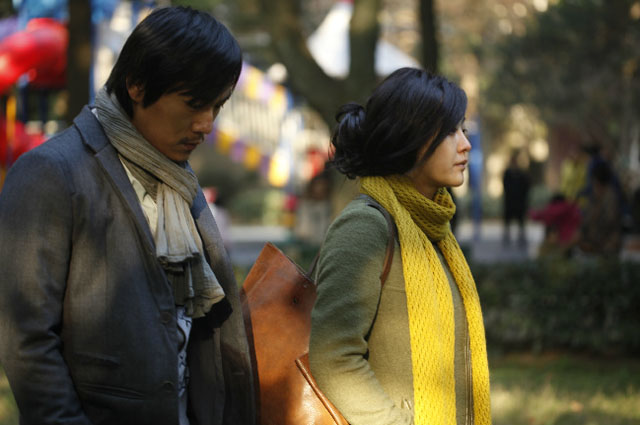“Six years after angering Chinese censors with his sexually and politically raw Cannes entry Summer Palace, Lou Ye makes a shrug-worthy official return to mainland filmmaking with Mystery,” writes Justin Chang in Variety. “An intriguingly lurid but oddly uninvolving tale of lust, deception, jealousy and murder that loses tension and credibility even as it springs twist after twist, this mopey potboiler reps a banal reminder of the stupidity of taking up with two hot-headed women simultaneously.”
The new film “centers on a businessman, Yongzhao (Qin Hao), with a secret second family and multiple lovers,” notes Melissa Anderson for Artforum. “Mystery opens with a spectacular hit-and-run and follows with two head bludgeonings (one in slo-mo), slaps (some self-inflicted), shrieking, revenge rutting, crooked cops, and a spectral visitation.”
“[I]t is certainly the best opening of a bad film that I’ve seen in a long time,” writes Brian Clark at Twitch. “But alas, despite some intriguing ideas, the plot of Mystery soon stalls and devolves into a convoluted adultery melodrama that finds [Lou] Ye relying on flashbacks and point-of-view shifts to cover for obvious plotting that sacrifices most of the film’s intrigue and suspense early on.”
In the Hollywood Reporter, Neil Young notes that Lou Ye responded to the five-year sanction on making films “by smuggling out 2009’s gay-themed Spring Fever—a surprise winner of Cannes’ Screenplay award—then going to France to make Love and Bruises. That steamy affair premiered at Venice last September but has made little subsequent impact on the festival circuit despite starring A Prophet‘s Tahar Rahim. For his speedy follow-up he goes back to China and unites the stars of Summer Palace and Spring Fever, Hao Lei and Qin Hao as Lu Jie and Yongzhao, a photogenic thirtyish couple with a cute young daughter…. Zeng Jian’s camera work—often hand-held or Steadicam—makes the most of a variety of mostly unappetizing urban settings in China’s fourth city, Wuhan, an industrial metropolis that’s been underused as a film-location in comparison with Shanghi and Beijing. Peyman Yazadian’s score, meanwhile, ladles on tinkling piano for poignant interludes and sonorous strings for the more dramatic sequences—many of which take place in drenching downpours of biblical proportions—underlining the conventional nature of this competently-made but ultimately underwhelming enterprise.”
“There’s sexual deceit, revenge, blackmail, and more murder before the film finishes,” notes Screen‘s Mike Goodridge, “and along the way, virtually all the characters have sacrificed any sense of decency in the quest for material riches and sexual fulfillment.”
“Lou Ye has marked himself out as a filmmaker who is ready to put sex on screen in a way few or none of his fellow Chinese filmmakers are willing or able to do,” writes the Guardian‘s Peter Bradshaw. “This intriguing if overcooked noir-melodrama is another case in point: a sexually intense thriller set in the colossal city of Wuhan in eastern China, which the director portrays as an unimaginably gigantic forest of featureless skyscrapers, their summits lost in the smog. The film has touches of Chabrol—and even a weird hint of Fatal Attraction—and also offers a sly satirical perspective on modern China’s new rush to capitalist riches and bourgeois prosperity.”
Cannes 2012 Index: a guide to the coverage of the coverage. For news and tips throughout the day every day, follow @KeyframeDaily on Twitter and/or the RSS feed.




